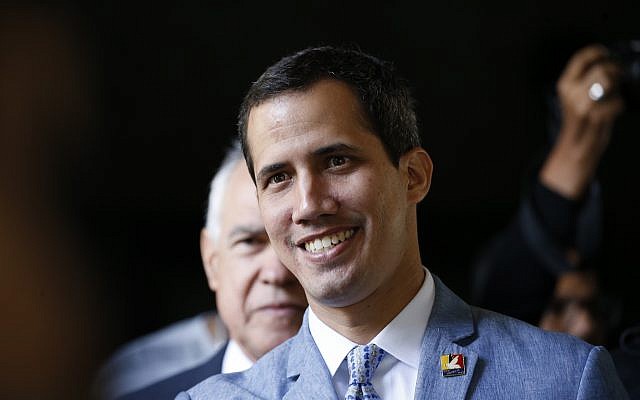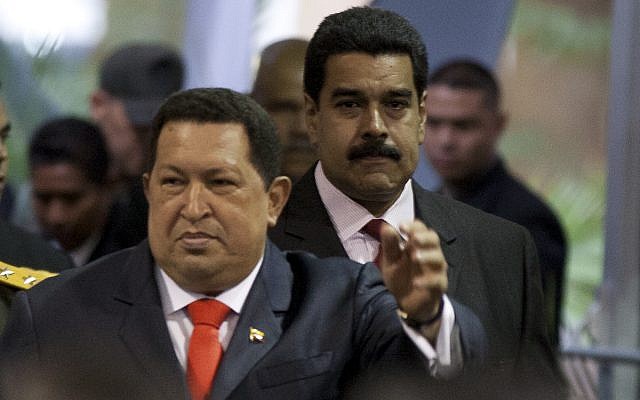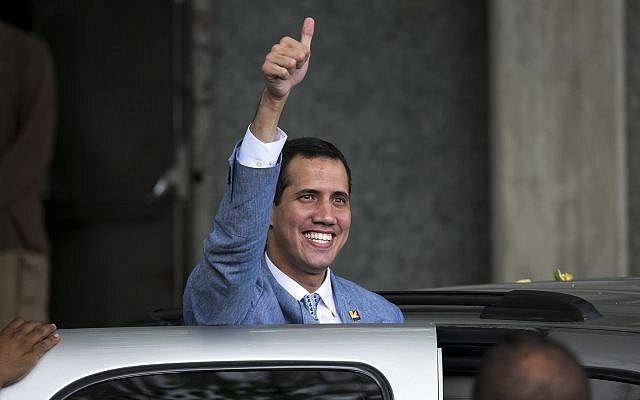
Venezuelan challenger Guaido says he’s working to renew ties with Israel
Self-proclaimed leader tells Israeli paper talks ‘at their height,’ doesn’t rule out embassy in Jerusalem; Foreign Ministry refuses to comment
Israel last month officially recognized the Venezuelan opposition leader’s interim government, with Prime Minister Benjamin Netanyahu saying in a short statement that “Israel joins the United States, Canada, most of the countries of Latin America and countries in Europe in recognizing the new leadership in Venezuela.”
Venezuela’s then-president Hugo Chavez broke off ties with Israel in 2009 after Operation Cast Lead in Gaza. Chavez and his successor, Maduro, have both been strident critics of Israel, and some Jewish community leaders have expressed fears of the government stoking anti-Semitism.
On Tuesday, the Israel Hayom daily published a short interview with Guaido, who indicated that his government would take a very different stance toward the Jewish state from his predecessor.
“We have begun working toward renewing the ties, and I’m very happy to announce that the process of stabilizing the relations with Israel is at its height,” Guaido said.
“It is very important to us,” he continued. “First we’ll restore the relations, then we’ll announce the appointment of an ambassador to Israel, and we very much hope an envoy will come here from Israel.”
Contacted by The Times of Israel, the Foreign Ministry had no comment on the report.
Venezuela and Israel had strong bilateral relations since the Jewish state’s creation, and until 1980 maintained an embassy in Jerusalem. It was then relocated to Tel Aviv along with other diplomatic missions, and closed down in 2009.

Asked whether he would return Venezuela’s embassy to Jerusalem, where it sat until 1980, Guaido answered: “That is one of the issues we are discussing. In due time, I will declare the renewed ties and the placement of the embassy.”
While Venezuela once had one of the largest Jewish communities in the region, numbering some 25,000 in 1999, only about 6,000 Jews are believed to remain in the country, with many of the rest having fled to Israel, Canada, the US and elsewhere.
“There are many Venezuelans in Israel and many Jews in Venezuela,” Guaido said. “It is a very active and prosperous community, that has contributed a great deal to our society. I assume they are happy we are renewing ties with Israel.”
Venezuela’s chief rabbi Isaac Cohen earlier this month said his community “accepts” Israel’s recognition of Guaido’s claim to power.
Support for Maduro, a vitriolic critic of Israel, isn’t high among Venezuela’s middle-class Jewish community. But throughout the unrest, the Jewish community had kept to a line of strict neutrality.
Addressing the Jewish community’s hesitance to publicly support him, Guaido added: “I have no doubt the Jews are afraid. Many in the military are similarly afraid to voice their opinion. This regime has no respect for the most basic right: the right to live.
“Many Western countries have promised to send humanitarian aid to Venezuela. I’m sure Israel will also help us.”

Amid wild inflation and severe shortages in basic commodities under Maduro, a far-left socialist, protests erupted across Venezuela. Security forces responded with raids that have killed dozens of people.
Guaido’s move was the most direct challenge to Maduro’s rule despite years of protests at home and international efforts to isolate the regime amid a growing humanitarian crisis fueled by falling oil prices and government mismanagement.